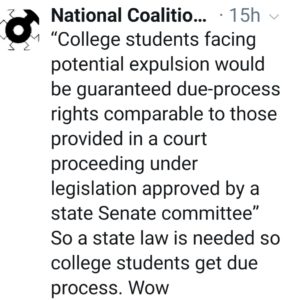COLLEGE DUE PROCESS Issues Addressed By Oklahoma Legislation
 College students facing potential expulsion would be guaranteed due-process rights comparable to those provided in a court proceeding under legislation approved by a state Senate committee. Senate Bill 1466, by Sen. Julie Daniels, creates the “Student and Administration Equality Act.” Under the legislation, any college student accused of a violation of the school’s disciplinary or conduct rules that carries a potential penalty of 10 or more days suspension or expulsion “shall have the right to be represented at the student’s expense by a licensed attorney or, if the student prefers, a nonattorney advocate.” Under the proposed law, the student’s attorney “may fully participate during the disciplinary proceeding” and would be allowed “the opportunity to make opening and closing statements, to examine and cross-examine witnesses, and to provide the accuser or accused with support, guidance, and advice.”
College students facing potential expulsion would be guaranteed due-process rights comparable to those provided in a court proceeding under legislation approved by a state Senate committee. Senate Bill 1466, by Sen. Julie Daniels, creates the “Student and Administration Equality Act.” Under the legislation, any college student accused of a violation of the school’s disciplinary or conduct rules that carries a potential penalty of 10 or more days suspension or expulsion “shall have the right to be represented at the student’s expense by a licensed attorney or, if the student prefers, a nonattorney advocate.” Under the proposed law, the student’s attorney “may fully participate during the disciplinary proceeding” and would be allowed “the opportunity to make opening and closing statements, to examine and cross-examine witnesses, and to provide the accuser or accused with support, guidance, and advice.”
“It’s very important that you make sure that anyone accused in these instances has full due process, even though they are not appearing in a court of law but they are essentially appearing before a tribunal,” said Daniels, R-Bartlesville. Daniels said the bill does not force colleges to change their policies regarding what actions can result in expulsion, but “simply makes sure that we have a full due process, orderly process, for the accused, the accuser, and the student organization.”
When the Foundation for Individual Rights in Education (FIRE) rated the top 53 universities in the country “based on 10 fundamental elements of due process,” the civil rights organization found “the vast majority of institutions lacked most of the procedural safeguards we looked for in written policies.” FIRE reported that just 28.3 percent of the universities reviewed “guarantee a meaningful hearing, where each party may see and hear the evidence being presented to fact-finders by the opposing party, before a finding of responsibility.” Only a distinct minority of schools allowed students to have the active participation of an advisor or provided the opportunity for “meaningful” cross-examination.
Nationally, a growing number of students have successfully sued colleges and universities for violations of due-process rights in disciplinary hearings. In 2018, the U.S. Court of Appeals for the Sixth Circuit sided with a student and ruled against the University of Michigan, declaring that “if a public university has to choose between competing narratives to resolve a case, the university must give the accused student or his agent an opportunity to cross-examine the accuser and adverse witnesses in the presence of a neutral fact-finder.”
ocpathink.org-Carter

